Recent Posts
Top Ways to Prevent Water Damage | SERVPRO of Bellevue
3/22/2024 (Permalink)
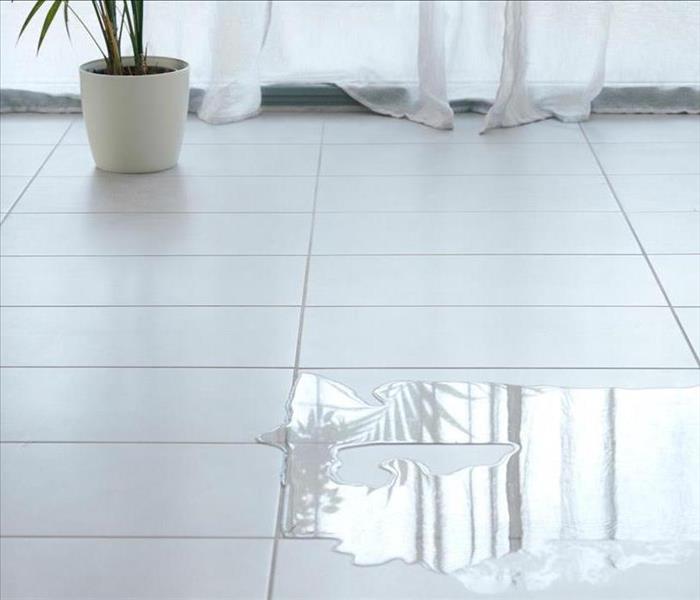 We know the aftermath of a home water leak can be disastrous. That’s why SERVPRO of Bellevue is here for your restoration needs. Call now!
We know the aftermath of a home water leak can be disastrous. That’s why SERVPRO of Bellevue is here for your restoration needs. Call now!
It can be a lot of work to be a homeowner. Between general maintenance duties and any HOA requirements, it seems like you are always working on one project or another. You are busy enough, so if you are able to prevent serious situations like water leaks from occurring, you can focus your time on more important things!
It is important to remember that preventing every single kind of water leak is simply not possible, but by following the tips below, you can significantly reduce your risk of suffering from serious water damage on a daily basis.
Securing the Exterior
One main culprit when it comes to water damage is rain! We are at risk of suffering water leaks whenever it is raining, drizzling or downpouring.
In order for this rain to be removed from your home, it needs to have a place to go. Keep your gutters clean and remove any debris regularly, and check your downspouts often to make sure they are on and pointed away from your home.
Do routine inspections of your windows and doors every season to check for drafts, gaps or cracks. As our homes age, worn seals can lead to hairline cracks that can invite water into your home and our windows and doors can actually begin to sag against their frames.
Finally, and this one may seem obvious, but be sure your windows are securely shut before it starts to rain. Rain can quickly become a problem from something simple as a forgotten open window.
Securing the Inside of Your Home
Water leaks can also begin inside your home due to some man-made accident or oversight. Keeping up with routine appliance maintenance is one of the best things you can do to prevent appliance malfunctions that end in serious water leaks. Clean them regularly to ensure the lines aren’t clogged, and replace parts as needed so they are always in good working order.
Another important task is to check your water lines often. Water is constantly flowing in and out of your home, and that can be troublesome if a simple water line becomes loose or a seal starts to give way. Check the lines in your utility room whenever you run a load of laundry and check under your sinks and fixtures when you are deep cleaning a space and address repairs as necessary.
The Benefits of a Professional Restoration
Water is unpredictable, and even if you do everything right, you can still suffer water damage at any point. Because of that, we want to reassure you that SERVPRO of Bellevue has your back.
We will get right to work tackling the standing water and addressing necessary repairs quickly. It is our goal to return your home to its preloss condition as quickly and as efficiently as possible.
Water damage can be really frustrating to deal with. Call SERVPRO of Bellevue for a quick and reliable recovery.
The Dangerous Progression of House Fires | SERVPRO of Bellevue
12/22/2023 (Permalink)
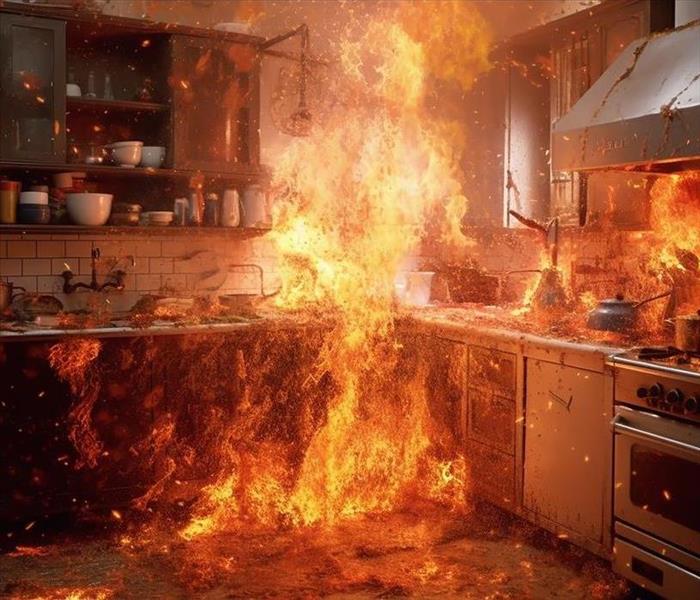 When an unexpected fire invades your home, SERVPRO of Bellevue is here to restore. Contact us today!
When an unexpected fire invades your home, SERVPRO of Bellevue is here to restore. Contact us today!
Suffering a house fire is perhaps one of the scariest possibilities that a homeowner could experience. The sheer danger alone is enough to keep you up at night, not to mention the potential for significant and widespread damage.
Unfortunately, thousands of house fires happen every year in the United States, and it could happen to you when you least expect it. Knowing how to get out of your home quickly is the most important fire safety information that you need to have.
Once a Fire Starts
House fires can start anywhere in your home at any point. A single forgotten candle, a kitchen mishap or even a grill fire that got out of control can lead to a serious situation.
Once a fire starts, it will spread quickly and start to consume everything in its path:
- After 30 seconds, a small flame will start to lick up the walls and consume curtains, cabinets and other flammable materials.
- After one minute, smoke will start to fill the room.
- After two minutes, the smoke and fire can make the entire room go black, which can disorient you.
- After five minutes, your entire home could be engulfed in flames, making escape really difficult or even impossible.
How to Get Out Safely
Your family should have a fire escape plan for your home, and this plan should be reviewed and practiced regularly so that everyone in your family understands what to do in an emergency. If you are in the room when the fire breaks out, exit quickly using the nearest door or window and call 911.
If you have to work your way through your home in order to get out, stay low below the smoke line and crawl if you have to in order to get out safely.
The faster you are able to get out, the safer you and your family will be. Toxic chemicals in fire smoke can disorient you and even make you sleepy, which can be really dangerous if you get stuck in a room or in your home somewhere. Once you are out, find your family at your predetermined meeting location and call 911.
Recovering After a Fire
Once the authorities have arrived and put out the fire, the reality of your situation will probably start to set in. House fires can cause extreme damage all over your home, so choosing a reliable company to help you recover can ensure a complete restoration.
That’s where SERVPRO of Bellevue comes into play! Our fire damage restoration team can help you recover from top to bottom. We will remove damaged debris, clean the affected area and tackle any stubborn smoke odors with ease. We will ensure a complete recovery for you no matter how extensive your house fire has become.
Suffered a house fire? Call SERVPRO of Bellevue day or night.
Why a Reliable Emergency Plan Matters | SERVPRO of Bellevue
12/22/2023 (Permalink)
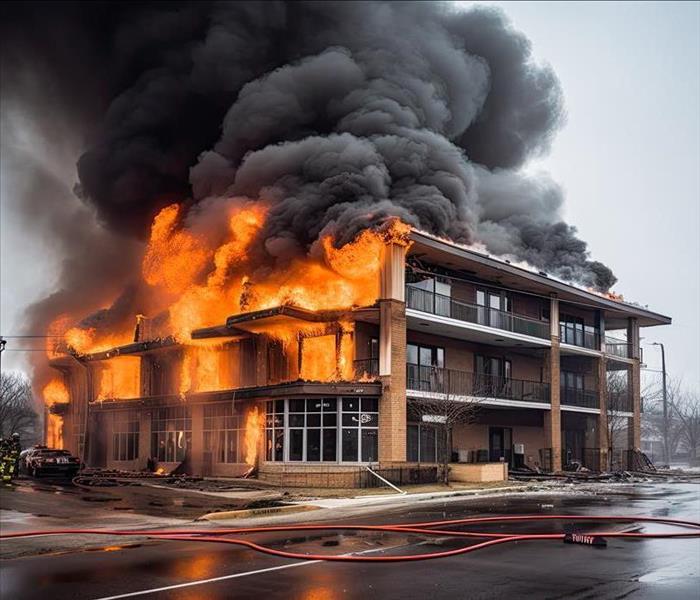 SERVPRO of Bellevue is here for all your commercial building restoration needs. Contact us now!
SERVPRO of Bellevue is here for all your commercial building restoration needs. Contact us now!
As business owners, we all know how important it is to have a plan. We plan for day-to-day activities, our year-end goals and even what we are going to serve at the next staff lunch. While these plans are all important and pretty predictable events, it is also important to plan for the unexpected.
Natural disasters and storm situations often take us by surprise or develop quickly, so having a reliable plan in place can help you and your staff stay safe in the face of chaos. Read on to learn how we can help your commercial property and business come up with an emergency plan.
The SERVPRO® Emergency Ready Plan
We are well-known for our top-notch restoration services, but we also have a commercial services division that is dedicated to helping our community navigate disaster. We can help you create an Emergency Ready Plan for your property to help you work through any sort of disaster situation that you can imagine. Having a plan ensures you stay in control and avoid permanent closures.
Did you know that about 25% of businesses don’t reopen after suffering from some sort of disaster? That has to be a heartbreaking decision, and it is our mission to make sure it’s a decision you never are faced with. Our Emergency Ready Plans outline what to do before, during and after a disaster situation so you always know what to expect.
How Is the Plan Created?
The first step is a no-cost assessment of your property. We will go from floor to floor to inspect every level and assess the different threats that could impact your business at any point.
We will then create a Profile Document based on the information we gather. This document outlines escape routes, fire extinguisher locations, first-aid kits and emergency exits. It can also be as detailed as outlining where to store important documents and how to create go-bags for employees to quickly grab while they exit.
We will also make sure to identify a strong chain of command for your employees so that everyone knows who is in charge of what throughout a typical disaster situation. For example, if your break room catches on fire, the document will have outlined who is supposed to call 911, who is in charge of getting the fire extinguisher and which staff are trained on how to use it.
Where We Step in to Help
The best kind of disaster is one that didn’t happen, but we know that many disaster situations are often not preventable. If you do everything right and still suffer some type of property damage, call SERVPRO of Bellevue for a quicker and more reliable recovery.
We will get right to work restoring and repairing every inch of your affected space, and we will work hard to minimize your downtime and get you back open for business in no time at all.
We can help you navigate disasters more confidently. Contact SERVPRO of Bellevue today.
Suspect Mold? What to Know About Mold Infestations | SERVPRO of Bellevue
12/22/2023 (Permalink)
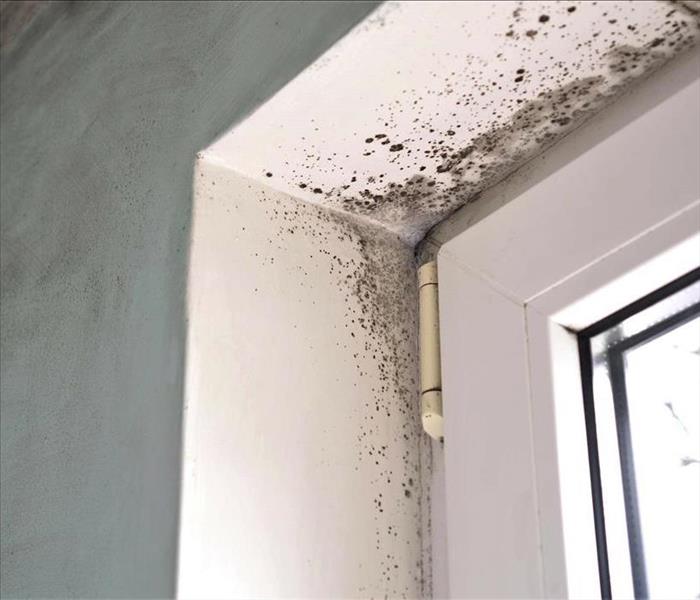 Has your home been impacted by mold overgrowth? SERVPRO of Bellevue is here for the rescue. Call us today!
Has your home been impacted by mold overgrowth? SERVPRO of Bellevue is here for the rescue. Call us today!
We all pride ourselves on our homes, and we put a lot of work into them to keep them safe, comfortable and functioning smoothly. They return the favor by keeping us out of the elements and providing us a cozy place to spend our free time. While no one ever wants to think about discovering something unpleasant in their homes, it is a reality that many are faced with on a daily basis.
Discovering a mold infestation is downright frustrating, and frankly, a little gross. Even the cleanest and most well-kept homes can become the victim of a mold infestation in the right conditions! Knowing what to do if you suspect a mold infestation is vital to catching it before it causes too much trouble.
Where Can Mold Grow?
Mold spores are microscopic and are constantly floating in the air in and around our homes. They can travel back and forth through windows and into vents and can be found in virtually every area of your home.
The good news is that mold doesn’t always start to grow even if you have the spores in your home. The right conditions have to be present for mold to settle in and grow. Mold loves to grow in damp, dark environments, making attics, basements and crawl spaces the perfect breeding ground for such infestations. Once a few spores start to spread, an entire colony can form in just 24 to 48 hours.
Discovering a Mold Infestation
One of the classic signs of a mold infestation is the smell. Since mold often grows in areas that don’t experience high traffic, it can grow silently for a long time without being discovered. If you notice a musty or earthy odor, it might mean that a mold infestation is just out of sight. Mold can also start to bubble paint, discolor walls and create soft spots.
If you notice any of these signs, you can do a visual inspection but don’t attempt any major construction without professional assistance. Certain types of mold can be dangerous to disturb and you should not breathe in the spores, so it can be hazardous to get involved without knowing what you are dealing with.
Call SERVPRO of Bellevue so we can take care of it for you! We will arrive quickly and assess the situation using the right gear and safety materials. If we do discover mold, we will identify the kind and make our recovery plan based on our findings. We will contain the area, filter the air and then work on cleaning up the mold and mold-infested materials.
Restoration Projects Post-Mold
Since mold is moist, that lingering moisture can cause some serious structural problems. Mold can slowly eat away at wood and drywall and lead to rot. Over time, that structural damage can compromise the safety of your home. We will work on repairing your home so that it is safe, secure and smelling fresh again in no time at all.
Mold infestations can become serious. Contact SERVPRO of Bellevue for a quick restoration.
'Tis the Season for Safety: Identifying Potential Fire Hazards from Seasonal Decorations
10/26/2023 (Permalink)
 Seasonal decorations bring warmth and cheer to our homes, but they can also bring potential fire hazards if we're not careful.
Seasonal decorations bring warmth and cheer to our homes, but they can also bring potential fire hazards if we're not careful.
The holiday season is a time for joy, celebration, and festive decorations that add warmth and charm to our homes. However, amidst the twinkling lights, wreaths, and candles, there's a hidden danger – the potential for fire hazards. It's essential to be aware of the fire risks associated with seasonal decorations to ensure a safe and happy holiday season. In this blog, we'll explore some common holiday decorations that can pose a fire hazard and provide tips on how to enjoy them safely.
Christmas Trees
Real or artificial, Christmas trees are often the centerpiece of holiday decorations. However, they can also be a significant fire hazard if not properly maintained.
- Real trees: Keep your live Christmas tree well-watered to prevent it from drying out and becoming a fire risk. Dry trees can ignite more easily, leading to a faster and more intense fire.
- Artificial trees: When using artificial trees, ensure they are labeled as fire-resistant. Also, inspect the wiring on pre-lit artificial trees for damage or wear.
Decorative Lights
String lights, both indoors and outdoors, are a beloved part of holiday decorating. However, they can pose fire hazards if not used and maintained correctly.
- Check lights for frayed wires, broken bulbs, or loose connections before use.
- Don't overload electrical outlets, and always follow the manufacturer's guidelines for how many light strands can be connected.
- Use LED lights, which generate less heat and reduce the risk of overheating.
Candles
Candles add a warm, cozy atmosphere to holiday gatherings, but they are open flames and should be handled with caution.
- Keep candles away from flammable materials, such as curtains, decorations, and wrapping paper.
- Never leave candles unattended, and extinguish them before leaving a room or going to bed.
- Consider using battery-operated LED candles for a safer alternative.
Holiday Wreaths and Greenery
Wreaths and garlands made from dried or artificial foliage can become fire hazards if exposed to heat sources or open flames.
- Keep these decorations away from fireplaces, space heaters, and candles.
- Ensure that any lights or electrical components used with these decorations are in good condition and UL-listed for safety.
Wrapping Paper and Packaging
The excitement of opening gifts can lead to a flurry of discarded wrapping paper and packaging materials, some of which can be flammable.
- Dispose of wrapping paper and packaging materials away from heat sources and open flames.
- Never throw wrapping paper or packaging into a fireplace or wood-burning stove.
Seasonal decorations bring warmth and cheer to our homes, but they can also bring potential fire hazards if we're not careful. By taking simple precautions and following safety guidelines, you can enjoy the holiday season without risking a fire-related disaster. Remember to keep your Christmas tree well-watered, inspect decorative lights, use candles responsibly, place holiday wreaths and greenery safely, and dispose of wrapping paper and packaging materials thoughtfully. With these safety measures in place, you can create a festive, cozy, and, most importantly, safe holiday atmosphere for you and your loved ones.
Paw-sitive Training and Supervision: Preventing Pet-Related Water Damage
9/20/2023 (Permalink)
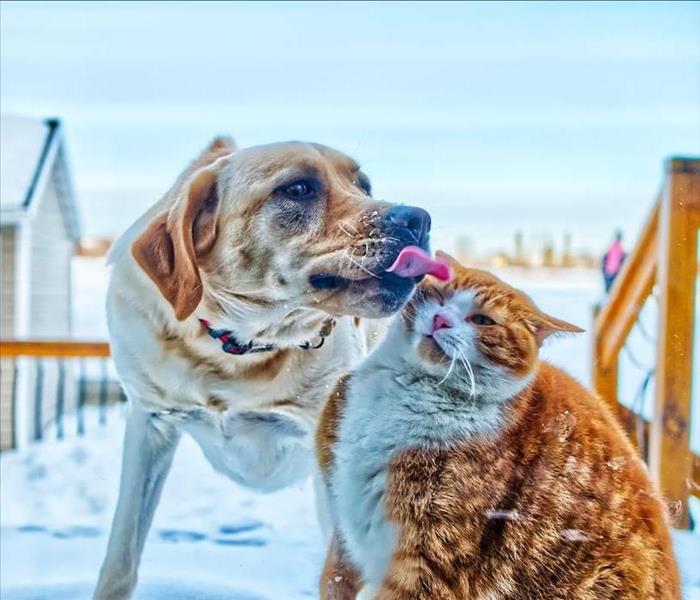 Pets, particularly dogs and cats, can inadvertently cause water damage in various ways.
Pets, particularly dogs and cats, can inadvertently cause water damage in various ways.
Our furry friends bring a lot of love and joy into our lives. However, it's crucial to remember that even the best-behaved pets can sometimes cause unexpected accidents that lead to water damage in our homes.
Understand the Potential Risks
Pets, particularly dogs and cats, can inadvertently cause water damage in various ways. Here are some common scenarios:
- Knocking over water bowls or containers: Excitable or curious pets may tip over their water dishes, creating puddles that can damage flooring or seep into subflooring.
- Scratching or biting water lines: Some pets may chew on or scratch water lines, causing leaks or ruptures in pipes.
- Potty accidents: Even well-trained pets can have occasional accidents indoors, leading to water-soaked carpets, rugs, and flooring.
- Splashing in or near water sources: Pets often splash water around when playing near sinks, bathtubs, or other water sources, potentially causing moisture damage to nearby surfaces.
Properly Supervise Your Pets
Supervision is the first line of defense against pet-related water damage. Here's how you can do it effectively:
- Keep an eye on your pets when they are near water sources, such as the kitchen sink, bathroom, or laundry room.
- Ensure that water bowls and containers are sturdy and secured to prevent spills.
- When introducing a new pet to your home, gradually acclimate them to the indoor environment and monitor their behavior closely.
Invest in Proper Training
Proper training is essential for preventing accidents and ensuring that your pets understand the boundaries within your home:
- Enroll your pets in obedience classes or work with professional trainers to teach them commands like "stay," "leave it," and "no."
- Use positive reinforcement techniques, such as treats and praise, to encourage good behavior.
- Crate training can be effective for puppies or new pets, as it helps limit their access to certain areas of the house when unsupervised.
Pet-Proof Your Home
Pet-proofing your home is another important step in preventing water damage. Here are some tips:
- Use pet-proof covers for furniture and bedding to protect against accidents.
- Consider using pet gates or barriers to restrict access to certain areas of your home.
- Store cleaning products and chemicals out of your pet's reach to prevent ingestion or spills.
- Regularly Inspect and Maintain Water Fixtures
Regular maintenance of water fixtures in your home can also help prevent pet-related water damage:
- Check for any signs of leaks or damage in and around water sources, such as sinks, faucets, and pipes.
- Keep your plumbing in good condition, as weak or damaged pipes are more susceptible to pet-induced damage.
Pets are the best, and their happiness is intertwined with our own. To ensure a damage-free living environment, proper supervision, training, and pet-proofing are essential. By taking these precautions, you can prevent pet-related water damage and enjoy a home that's both pet-friendly and water-safe. Remember, a well-trained and supervised pet is a happy pet, and a happy pet makes for a happy home.
The Silent Threat Of Electrical Fires
7/7/2023 (Permalink)
 Electrical fires are silent and can often go unnoticed until significant damage has taken place.
Electrical fires are silent and can often go unnoticed until significant damage has taken place.
Electrical fires pose a significant risk to homes and businesses, often resulting in devastating consequences. Understanding the common causes of electrical fires is essential for identifying potential hazards and taking preventive measures. Let's look into three ways electrical fires can start.
Faulty Wiring and Outdated Electrical Systems
One of the leading causes of electrical fires is faulty wiring or outdated electrical systems. Over time, electrical components may deteriorate, leading to loose connections, worn-out insulation, or frayed wires. These conditions create points of resistance that can generate heat, sparking electrical fires. Additionally, outdated electrical systems may not be equipped to handle the power demands of modern appliances and electronics, increasing the risk of overload and overheating. Regular inspections, timely upgrades, and professional maintenance of electrical systems are crucial for preventing fire hazards associated with faulty wiring.
Overloaded Circuits and Extension Cord Misuse
Overloading electrical circuits is another common cause of electrical fires. Plugging too many appliances or devices into a single outlet or circuit can surpass its intended capacity, resulting in overheating and electrical failures. Over time, the excessive heat generated can ignite surrounding materials and trigger a fire. Similarly, the misuse of extension cords—such as using them as a permanent wiring solution or overloading them with high-wattage devices—can lead to overheating and electrical fires. It is important to distribute electrical loads properly, avoid overloading circuits, and use extension cords sparingly and appropriately.
Electrical Appliance Malfunctions
Electrical appliances are integral to our daily lives, but they can become fire hazards if not used and maintained correctly. Malfunctions within appliances, such as damaged cords, faulty switches, or overheating components, can cause electrical fires. Over time, the accumulation of dust, lint, or other debris within appliances can obstruct ventilation, leading to overheating and potential ignition. Regularly inspecting and maintaining appliances, avoiding the use of damaged cords or plugs, and following manufacturer's instructions for proper usage and maintenance are vital for reducing the risk of appliance-related electrical fires.
Electrical fires can have catastrophic consequences, but they are preventable with the right precautions and awareness. By understanding the common causes of electrical fires—faulty wiring and outdated electrical systems, overloaded circuits and extension cord misuse, and electrical appliance malfunctions—we can take proactive steps to mitigate these risks. Regular inspections, timely upgrades, and professional maintenance of electrical systems, along with responsible usage and distribution of electrical loads, are essential for fire safety. Remember, prioritizing electrical safety is not just about protecting property; it is about safeguarding lives. Let us remain vigilant, promote awareness, and ensure responsible electrical practices to prevent electrical fires and create a safer environment for all.
Summertime Fire Hazards
6/30/2023 (Permalink)
 Make sure to minimize and eliminate fire hazards throughout your home.
Make sure to minimize and eliminate fire hazards throughout your home.
Summer is a season filled with sunshine, outdoor activities, and relaxation. However, it's important to be aware of the potential fire hazards that come with the warmer months. Many common activities and appliances can pose risks if not handled with caution. In this blog, we will explore five common household fire hazards that you should be mindful of during the summer season.
Outdoor Grilling
Grilling is a favorite summer activity for many families, but it can also lead to dangerous fires if proper precautions are not taken. Keep your grill a safe distance from any flammable structures or materials, such as wooden decks or overhanging tree branches. Ensure that the grill is placed on a stable surface and never leave it unattended while in use. Remember to properly extinguish the grill's flames and coals once you're done cooking.
Improper Use of Electrical Appliances
With the increase in air conditioning usage during hot summer months, electrical appliances become more prone to overheating. Avoid overloading electrical outlets with multiple devices, as it can lead to electrical fires. Be cautious with the use of extension cords and ensure they are not pinched or frayed. Regularly inspect and clean appliances, such as fans and air conditioners, to prevent dust buildup that can lead to malfunctions and potential fires.
Outdoor Lighting and Decorations
As the evenings are longer during summer, many households decorate their outdoor spaces with lights and other decorative items. However, if not used safely, these can become fire hazards. Opt for outdoor lights that are specifically designed for outdoor use and follow the manufacturer's instructions. Keep flammable materials, such as curtains or plants, away from light fixtures, and avoid overloading electrical outlets.
Fireworks
Fireworks are a popular part of summer celebrations, but they can also cause severe injuries and fires if mishandled. Always check your local laws and regulations regarding fireworks and only purchase legal and approved fireworks from reliable sources. Follow the safety instructions carefully and never attempt to relight a malfunctioning firework. Keep a bucket of water or a fire extinguisher nearby when using fireworks, and ensure you are in an open, fire-safe area.
Outdoor Campfires
Camping and bonfires are enjoyable summer activities, but they can quickly turn dangerous if not managed properly. Check local regulations and obtain any necessary permits before starting a campfire. Clear the area around the fire pit from flammable debris and keep a safe distance from structures, trees, and overhanging branches. Always have a bucket of water or a fire extinguisher nearby to extinguish the fire completely when finished.
Enjoying the summer season can come with potential fire hazards. By being aware of these common household fire hazards and taking preventive measures, you can ensure a safer and more enjoyable summer. Practice proper safety protocols when grilling, using electrical appliances, decorating with lights, handling fireworks, and enjoying outdoor campfires. Stay vigilant, educate your family and guests about fire safety, and remember that prevention is key in avoiding fire-related accidents during the summer months.
How Summer Heat Can Damage Your Property
5/16/2023 (Permalink)
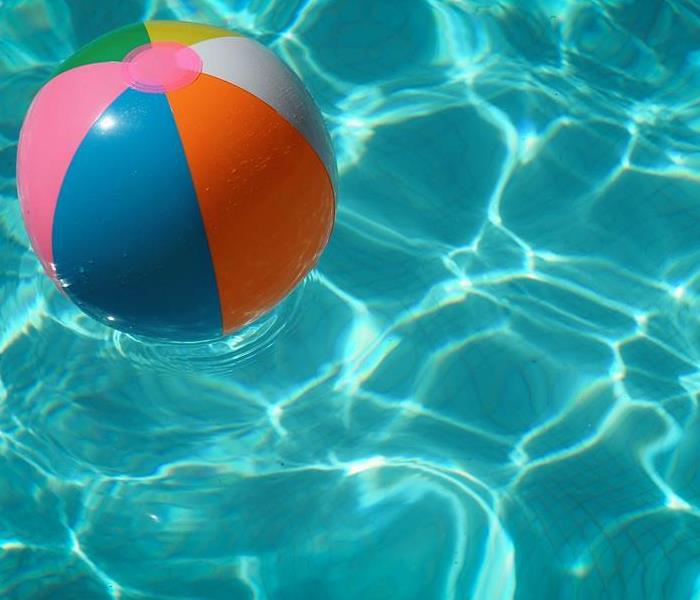 The summer heat can cause surprising damage to your home or other property.
The summer heat can cause surprising damage to your home or other property.
As the temperature rises and the sun shines brightly, summer brings joy and relaxation to our lives. However, this season also poses potential risks to our homes and businesses. From scorching heatwaves to powerful storms, the summer months can inflict significant damage, requiring restoration and mitigation efforts. In this blog, we will explore common ways in which homes and businesses can be affected during summer and discuss preventive measures to safeguard your property.
Intense Heatwaves: During the summer months, heatwaves can be relentless, subjecting homes and businesses to extreme temperatures. Prolonged exposure to high temperatures can lead to various problems, such as cracked foundations, warped wood, and damaged electronics. To mitigate heat-related damage, ensure your property has proper insulation and ventilation. This will help maintain a stable indoor temperature and reduce the strain on cooling systems. Installing reflective roofing materials and using window coverings, such as blinds or curtains, can also aid in minimizing heat absorption.
Damaging UV Rays: The summer sun is a source of rejuvenation, but it can also cause harm. Ultraviolet (UV) rays can fade furniture, artwork, and flooring over time. To protect your property from UV damage, consider applying UV-resistant film to windows and using blinds or shades to block out direct sunlight. Moreover, using UV-protective coatings on outdoor surfaces, such as decks or fences, can prolong their lifespan and maintain their aesthetic appeal.
Thunderstorms and Lightning: Summer often brings intense thunderstorms with lightning strikes, posing a significant risk to homes and businesses. Lightning can cause power surges, electrical fires, and damage to electronic devices. To mitigate these risks, consider installing lightning rods on tall structures, as they divert the electrical charge away from the building. Additionally, surge protectors should be installed at power outlets to safeguard electronic equipment. Regularly inspecting your property's electrical system and promptly addressing any issues can help prevent damage caused by lightning strikes.
Heavy Rainfall and Flooding: Summer showers can quickly escalate into torrential downpours, leading to flash floods and water damage. Proper drainage systems, such as gutters and downspouts, are essential for directing rainwater away from your property. Regularly clean and maintain these systems to ensure efficient water flow. Additionally, grading the land around your home or business can help prevent water from pooling near the foundation. In areas prone to flooding, installing a sump pump or considering flood insurance can provide further protection against water damage.
Wildfires: Summer is often associated with an increased risk of wildfires, especially in dry and arid regions. To reduce the risk of fire damage, create a defensible space around your property by clearing away dry vegetation and maintaining proper landscaping. Additionally, ensure your property has a fire-resistant roof and exterior materials. Familiarize yourself with local evacuation plans and have a well-practiced emergency preparedness strategy in place to protect your home or business.
Pest Infestations: Warmer temperatures during summer can attract unwanted visitors in the form of pests, such as ants, termites, mosquitoes, and rodents. These pests can cause damage to structures, contaminate food supplies, and pose health risks. Regularly inspect and seal any cracks or openings in your property's exterior to prevent pests from entering. Maintain a clean environment, promptly address any signs of infestation, and consider professional pest control services to mitigate the risk of damage and health hazards.
While summer offers enjoyable moments, it's crucial to be proactive in protecting our homes and businesses from potential damage. By implementing preventive measures such as proper insulation, UV protection, lightning safety measures, drainage systems, fire-resistant measures, and pest control, we can minimize the risk of damage. Regular maintenance and vigilance are key to preserving the integrity of our properties and ensuring a safe and pleasant summer season.
Rain in Bellevue
4/19/2023 (Permalink)
 Rain is both beautiful and destructive.
Rain is both beautiful and destructive.
Bellevue is known for its stunning natural beauty, but it's no secret that the area can experience some intense rain. While these rainstorms can be a welcome sight for those who enjoy a cozy night in, they can also cause serious damage to residential and commercial properties.
One of the most common ways that rainstorms can damage residential and commercial properties is through flooding. When there is heavy rain, the water can quickly accumulate and cause flooding, which can lead to serious damage to your property. This is particularly true if your property is located in a low-lying area or if your property does not have adequate drainage systems. Flooding can cause damage to your foundation, walls, floors, and furniture, and it can also lead to the growth of mold and mildew, which can be harmful to your health.
Another way that rainstorms can damage properties is through leaks in the roof or walls. When there is heavy rain, the water can penetrate small cracks or holes in your roof or walls, causing water damage and mold growth. If these leaks are not repaired quickly, they can lead to serious structural damage and even collapse. This is particularly true for older properties or properties that have not been properly maintained.
In addition to flooding and leaks, rainstorms can also cause damage to your property through strong winds and falling debris. When there is heavy rain, there is often also strong wind, which can cause trees, branches, and other debris to fall onto your property. This can cause damage to your roof, windows, and siding, and it can also pose a serious safety risk to you and your family.
So, what can you do to protect your property from rainstorm damage? It's important to ensure that your property has adequate drainage systems, such as gutters and downspouts, to help prevent flooding. If you do experience flooding, it's important to act quickly and contact a professional water damage restoration company to help mitigate the damage and prevent mold growth.
It's also important to regularly inspect your roof and walls for any signs of damage, such as cracks or holes. If you do notice any damage, it's important to have it repaired as soon as possible to prevent water damage and mold growth.
While rainstorms can be a welcome sight in Bellevue, they can also cause serious damage to residential and commercial properties. Flooding, leaks, and falling debris are all potential hazards during heavy rain, and it's important to take steps to protect your property from these risks. By ensuring that your property has adequate drainage systems, regularly inspecting your roof and walls for damage, and maintaining any trees or branches near your property, you can help protect your property from rainstorm damage and keep your home or business safe and secure.
 We know the aftermath of a home water leak can be disastrous. That’s why SERVPRO of Bellevue is here for your restoration needs. Call now!
We know the aftermath of a home water leak can be disastrous. That’s why SERVPRO of Bellevue is here for your restoration needs. Call now!






 24/7 Emergency Service
24/7 Emergency Service








